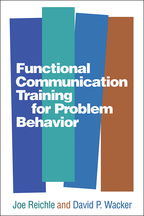Functional Communication Training for Problem Behavior
Joe Reichle and David P. Wacker
“From two highly regarded researcher-clinicians, this is a valuable guide to one of the most widely researched treatments for behavior problems in children with moderate and severe disabilities. The authors provide step-by-step information about how to properly assess challenging behaviors, as well as how to tailor FCT for a range of individuals. The authors’ experience using this technique shines throughout the chapters, which are chock-full of useful case examples. Tips for dealing with frequently encountered obstacles are highlighted. This book will serve as an excellent supplemental text for classes on applied behavior analysis.”
—V. Mark Durand, PhD, Department of Psychology, University of South Florida St. Petersburg
“Reichle and Wacker bring together their unique and exceptional expertise in language science and behavior analysis to construct an authoritative work on the theory and practice of FCT. This book is an important reference for clinicians and graduate students who serve or study children with severe problem behavior. A primary strength of the book is the clear, cogent way the authors explain the concepts and procedures relevant to effective treatment.”
—Wayne W. Fisher, PhD, BCBA-D, Henry Rutgers Endowed Professor of Pediatrics, Robert Wood Johnson Medical School; Director, Rutgers Center for Autism Research, Education, and Services (RUCARES), Rutgers, The State University of New Jersey; Director, Children's Specialized Hospital–RUCARES
“Reichle and Wacker provide an accessible summary of the scientific case for including functional communication as part of behavior support plans. The book details how to assess communicative needs and apply this information to the selection of intervention strategies. Readers will appreciate the authors’ focus on the practical implementation steps that often make the difference between success and failure. School psychologists, teachers, behavior specialists, and the family members they work with will find clear guidance for improving behavior support.”
—Robert H. Horner, PhD, Special Education Program (Emeritus), University of Oregon
“Everything you need to know about planning and delivering FCT for socially reinforced challenging behavior is in this user-friendly book. The volume is remarkably comprehensive, yet focused. The expert authors link FCT procedures to developmental and learning processes and use rich descriptions and case examples to paint a vivid picture of the intervention process. I highly recommend this book as a course text for upper-level undergraduate or graduate students in special education, augmentative communication, and related fields, or as a training resource in residential, vocational, or educational facilities that serve children and adolescents with problem behavior.”
—Jennifer J. McComas, PhD, Department of Educational Psychology, University of Minnesota, Twin Cities
Table of Contents
1. Introduction to Functional Communication Training2. The Selection of Communicative Function(s) to Teach and How They Are Expressed
3. An Integrative Model to Establish Communicative Alternatives and Enhance Self-Regulatory Skills
4. Examples of Antecedent-Focused Intervention Strategies
5. Teaching Communicative Protesting as an Alternative to Avoidance-Maintained Problem Behavior, with Quannah Parker-McGowan and Jeff Sigafoos
6. Teaching Requesting Assistance
7. Requesting a Break
8. Teaching Communicative Requests as an Alternative to Problem Behavior Maintained by Attention
9. Teaching Communicative Requests as an Alternative to Problem Behavior Maintained by Tangibles
10. Describing Functional Communication Training as a Component of an Effective Behavior Support Plan: What We Know and What We Still Need to Know
Glossary
References
Index
About the Authors
Joe Reichle, PhD, is Professor of Speech–Language–Hearing Sciences and Research Director of the Leadership and Education in Neurodevelopmental Disabilities Training Program at the University of Minnesota. A Fellow of the American Speech–Language–Hearing Association, Dr. Reichle has expertise in augmentative communication, communication intervention for persons with significant developmental disabilities, and positive approaches to meet the needs of persons who engage in challenging behavior. He has published over 140 articles, chapters, and books, and served as an associate editor of the Journal of Speech, Language, and Hearing Research and Language, Speech, and Hearing Services in Schools. He has extensive experience delivering technical assistance to public schools and group homes.David P. Wacker, PhD, is Professor Emeritus of Pediatric Psychology at The University of Iowa, where he directed biobehavioral outpatient services for children and adults with developmental disabilities who display severe problem behavior, such as self-injury. A Fellow of the Association for Behavior Analysis International and the American Psychological Association, Dr. Wacker is a past editor of the Journal of Applied Behavior Analysis. His work has focused on training parents to implement functional communication training (FCT) in their homes or in community settings. His current research investigates how to best implement functional analysis and FCT in homes via the use of telehealth.
Contributors
Quannah Parker-McGowan, PhD, is a Postdoctoral Fellow in the Leadership and Education Program at the University of Minnesota.Jeff Sigafoos, PhD, is Professor of Educational Psychology at the University of Wellington, Victoria, New Zealand.
